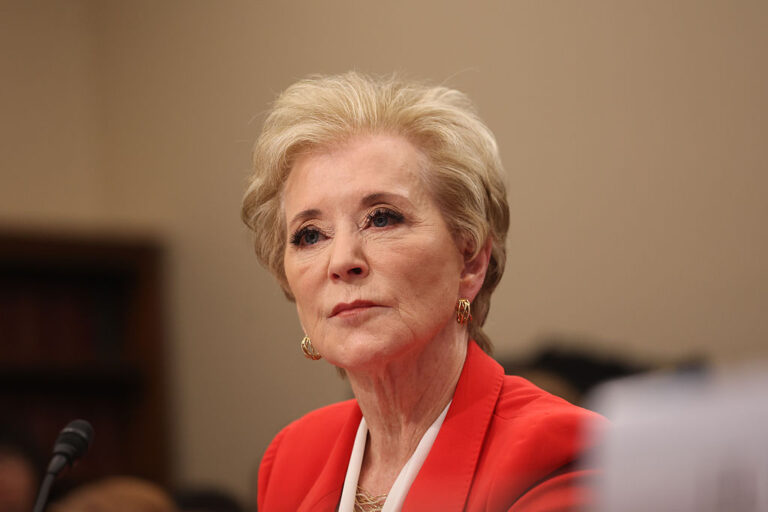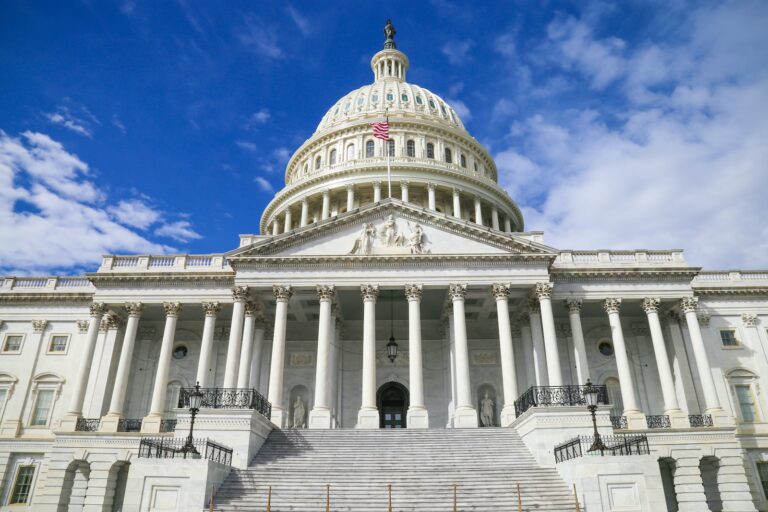Yesterday, Secretary of Education Linda McMahon appeared before the House Appropriations Subcommittee on Labor, Health and Human Services, Education, and Related Agencies to present and defend the Trump Administration’s FY 2026 budget request.
The request outlines $66.7 billion in discretionary funding for the U.S. Department of Education—a $12 billion reduction from the prior fiscal year—as part of a broader push to reduce the federal government’s role in education and increase state autonomy.
McMahon used the hearing to emphasize a directional shift: streamlining the Department’s operations, rethinking federal grant structures, and shifting more decision-making power to states and families. The hearing also surfaced sharp partisan divisions, with Democratic lawmakers raising concerns about transparency, funding obligations, and the long-term impact of cuts.
Redefining Federal Education Priorities
Secretary McMahon’s testimony highlighted three priorities, which she framed as essential to confronting academic stagnation and bureaucratic inefficiency:
- Expanding access to school choice;
- Improving early literacy outcomes; and
- Devolving education decision-making to state leaders.
“We’ve lost the fundamental basics,” McMahon said, calling for renewed focus on the science of reading. “If we can get that right, I think we’re going to see a great deal of improvement in our schools.”
The budget proposes consolidating 18 formula and competitive grant programs into a single $2 billion flexible block grant to states, with the aim of reducing administrative overhead and streamlining compliance requirements. McMahon asserted that 47 cents of every existing federal education dollar goes towards non-instructional costs, including compliance activities. In addition to the block grant, the proposal includes a $60 million increase for charter schools and maintaining funding for Title I-A and IDEA.
Congressional Pushback on Departmental Vision
While Republican members largely echoed McMahon’s focus on local control and streamlined federal oversight, Democratic lawmakers were vocal in their opposition. Ranking Member Rosa DeLauro (D-CT) questioned whether the Department was withholding funds already approved by Congress under FY 2024 appropriations (and the continuing resolution currently in place). “Are you planning to break the law by impounding congressionally appropriated funds?” she asked.
McMahon maintained that the Department was in the process of reviewing all programs and emphasized, “We will abide by the law,” a phrase she repeated throughout the hearing in response to legal concerns about funding implementation under the continuing resolution.
Rethinking Postsecondary Pathways
McMahon also used the hearing to push for a broader reimagining of the postsecondary landscape. She argued that four-year degrees are no longer the singular path to career success, and that curriculum and programs should be tailored to local workforce needs. She promoted work-based learning, apprenticeships, and trade education as integral to economic growth.
In parallel, the Department is pursuing internal restructuring to cut costs and reduce its physical and administrative footprint. McMahon also highlighted the efforts related to student loan repayments and the collection of $100 million since May 1.
Spotlight on TRIO and GEAR UP
One of the most contentious exchanges centered on proposed cuts to the TRIO and GEAR UP programs, which support college readiness and access for low-income and first-generation students. The administration’s FY26 budget would eliminate funding for these programs.
Lawmakers from both parties pressed McMahon to explain the rationale, especially given the programs’ bipartisan support. McMahon responded that while the programs offer valuable services, they are being reevaluated for efficiency and necessity. She cited examples of spending she viewed as questionable and suggested that postsecondary institutions are increasingly capable of—and should be—performing similar outreach on their own.
She did confirm that TRIO funding for the current fiscal year would be disbursed as scheduled, with awards expected by July 1.
What’s Next
McMahon’s testimony reinforced the Administration’s push toward decentralization and fiscal tightening; but it should also assuage some concerns by reiterating support for Title I-A and IDEA. The coming months will test the Administration’s ability to advance that agenda in the face of congressional skepticism and existing legal requirements. But McMahon’s central message was consistent: “We can no longer have the status quo.”
Go Deeper:
- Judge Blocks Trump Administration From Dismantling Education Department [The New York Times, subscription model]
- House to try to override veto of EPA spending bill [POLITICO Pro, subscription model]
- Democrats Hammer Linda McMahon Over Education Department Cuts [The New York Times, subscription model]
- Education Secretary McMahon testifies on 2026 budget request in House hearing [PBS News]
- McMahon defends $12B proposed cut to the Education Department [Higher Ed Dive]
- McMahon Takes Flak From Democrats, Republicans at Congressional Budget Hearing [The 74]
Photo Caption: Linda McMahon, US education secretary, during a House Appropriations hearing in Washington, DC, US, on Wednesday, May 21, 2025. President Donald Trump’s administration is pressuring elite US colleges, including Harvard, to make policy changes, citing a need to fight campus antisemitism and enforce civil rights protections.
Photo Credit: Alex Wroblewski/Bloomberg via Getty Images




